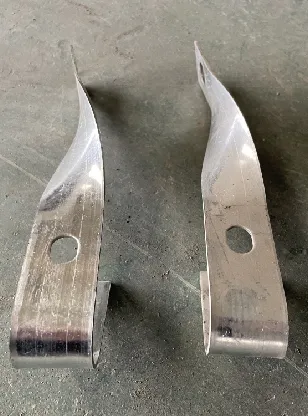loading...
- No. 9, Xingyuan South Street, Dongwaihuan Road, Zaoqiang County, Hengshui, Hebei, China
- admin@zjcomposites.com
- +86 15097380338
- Welcome to visit our website!
frp pressure vessel filter
Understanding FRP Pressure Vessel Filters
Fiber Reinforced Plastic (FRP) pressure vessel filters have emerged as essential components in various industrial processes, particularly in water treatment, chemical processing, and oil and gas industries. These advanced filters leverage the unique properties of FRP materials, which include high strength-to-weight ratios, corrosion resistance, and durability. This article delves into the functionality, advantages, and applications of FRP pressure vessel filters.
What are FRP Pressure Vessel Filters?
FRP pressure vessel filters are specialized containers designed to house filtration systems under pressure. Constructed from composite materials, these vessels are reinforced with fibers, typically glass or carbon, providing exceptional tensile strength and resistance to harsh environmental conditions. They are utilized for filtering out contaminants from liquids, thereby enhancing the efficiency and safety of various operations.
Advantages of FRP Pressure Vessel Filters
One of the primary benefits of FRP pressure vessels is their lightweight nature. Compared to traditional metal vessels, FRP filters are significantly lighter, making them easier to transport and install. This feature is especially advantageous in industries where space is a premium or where portability is a necessity.
Additionally, the corrosion resistance of FRP materials ensures longer service life and reduced maintenance costs. Unlike metal vessels that may degrade when exposed to aggressive chemicals or saline environments, FRP stands up to these challenges, extending the lifespan of the filter systems.
frp pressure vessel filter

Moreover, FRP pressure vessel filters can be tailored to meet specific operational requirements. The design flexibility allows for custom shapes, sizes, and filtration capabilities, making these filters suitable for a wide array of applications.
Applications in Industry
FRP pressure vessel filters are extensively used in several applications. In water treatment facilities, they serve to filter drinking water, removing harmful pathogens and impurities, thus ensuring safer consumption. In the chemical processing industry, these filters are critical in protecting equipment from contaminants, thereby enhancing operational efficiency.
The oil and gas sector also benefits from FRP filters, where they are applied in separating crude oil from water and other particulates during extraction and processing. Their robustness and reliability in extreme conditions make them indispensable in this field.
Conclusion
In conclusion, FRP pressure vessel filters represent a significant advancement in filtration technology. Their lightweight, corrosion-resistant properties, combined with their versatility, make them an optimal choice for various industrial applications. As industries continue to evolve, the demand foring enhanced filtration solutions will likely grow, further solidifying the importance of FRP pressure vessel filters in modern industrial practices.
-
GRP Structures: The Future of Lightweight, High-Performance EngineeringNewsJun.20,2025
-
FRP Water Tank: High-Performance Storage for Corrosive and Clean Water SystemsNewsJun.20,2025
-
FRP Square Tube: The New Industry Standard for Chemical and Structural ApplicationsNewsJun.20,2025
-
FRP Pultruded Profiles: The Ultimate Choice for Lightweight Structural StrengthNewsJun.20,2025
-
FRP Handrails: The Safer, Smarter, and Stronger Choice for Modern InfrastructureNewsJun.20,2025
-
FRP Grating: The Smart Solution for Durable, Lightweight Industrial FlooringNewsJun.20,2025
-
Why Choose a Galvanized Water Tank for Your Storage NeedsNewsMay.21,2025
